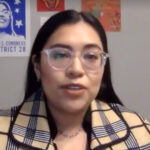Democratic challengers for the House of Representatives District 28 seat, currently held by U.S. Rep. Henry Cuellar, participated in a public forum on Monday to share their platform, though the incumbent was notably absent.
The forum hosted by Futuro RGV and moderated by former McAllen Mayor Jim Darling was intended to allow candidates to share their political platforms instead of engaging in a traditional debate.
Both challengers, Tannya Benavides and Jessica Cisneros, held similar positions on immigration reform, the international trade agreement, gun control and healthcare, though their differences stemmed primarily from their professional backgrounds.

Cisneros cited her experience running against the incumbent in the last election cycle and her legal work that lent her insight into the immigration system.
“You might remember me from our last time around,” Cisneros said, referencing the first time she ran against Cuellar and lost by 3.5% of the votes.
Cisneros is an immigration attorney from Laredo whose father was a ‘trailero,’ a career that influenced Cisneros’ views on trade.

Benavides noted her work advocating against the construction of the border wall and the experience she’s gained from a teacher’s perspective.
“I am an educator, a first-generation American and a community organizer. I was born in Brownsville and raised in Laredo, Texas since I was 5 years old,” Benavides said.
Aside from the traditional topics of immigration and trade, access to health care was a priority for both.
Darling asked the candidates what they would do to ensure residents have access to affordable and equitable health care.
Benavides cited the high rate of uninsured residents in South Texas and said she’s in favor of lowering the age of eligibility for Medicare to insure more people and improve medical infrastructure, especially in rural areas.
“We need to make sure that we’re not making people drive every which way, 30 to 40 minutes, to get the critical care that they need, or be airlifted out of their cities so that they can stand between the meaning of life or death,” Benavides said.
Cisneros said health care was the issue that originally propelled her to run for Congress.
“I lost a loved one, because we couldn’t afford her care. I was a 13-year-old selling plates of food on the side of the highway to try to fundraise,” Cisneros recalled. “I know that story is so common for so many people here because every Saturday you can just walk out and you’ll see people trying to do the same thing.”
On topics like the border wall, creating a pathway to citizenship for DREAMERs and granting more immigrant work visas, Benavides and Cisneros stood on the same side, opposing the wall and supporting a pathway for citizenship and issuance of more work visas.
Though Cuellar did not attend the Zoom forum, both challengers mentioned him during their address of the Protecting Right to Organize Act, also known as the PRO Act. Cuellar was the only Democrat who voted against it, bucking the political trend. Five Republicans voted for it.
Cuellar’s work with the GOP gained him a reputation for bipartisanship. Though the Democratic challengers agreed that there’s a need to reach across the aisle, they expressed different approaches than the incumbent.
“I think one of the first things that I would absolutely push for the moment I step on Capitol Hill is express my support for the bipartisan piece of legislation known as the PRO Act,” Cisneros said.
Benavides cited a “proven record” working with people with differing political ideologies during her activism work.
“I know people are surprised by hearing this, but we had people on the Republican side that were against the border wall. And we decided to come together and work on those issues that we do agree with,” Benavides said.
Both Laredoans stressed the importance of the border and challenged the perspectives espoused by outsiders, including lawmakers, when looking at District 28.
“I think a lot of people pigeon-hole saying that this is an area of the country that we have to deal with just in terms of immigration, but they don’t take a look at the community that is permanently living here,” Cisneros said. “We are more than just a gateway for migrants coming into the United States, although an important function. There are people who are permanently living here.”
Benavides let out a chuckle answering the question about whether border communities are safe. She admitted it was a question that comes up often during her door-knocking experience.
“The border is not this war-torn place that people have in their heads,” Benavides said. “That is just an idea that we need to reject. We can walk down to the river and have this interview right there right now.”



